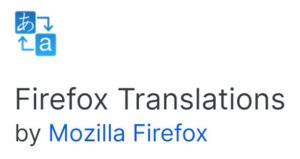Firefox Translations provides automated translation of web content. Unlike cloud-based alternatives, translation is done locally, on the client-side, so that the text being translated does not leave your machine (Firefox website).

Do you use Google Translate, DeepL or other online translation tools? Hundreds of millions of people use online Machine Translation (MT) every day. If you are one of these people, then you may have asked yourself if the data you upload for translation is seen or used by that company. Well, is your data safe?
According to the Google Translate terms, your data is 100% safe. It is only stored for a short time on Google’s servers. Your content is not used to train the Google MT servers nor to improve the quality of the translation. Microsoft’s terms are similar and it would appear that your data is 100% safe. DeepL’s terms are different, and the company states that it makes use of your content for various purposes.
So, is your data safe?
Anyone who is concerned about data security and safety should take the time to read the T&S of each online translation software application. It would appear that when using any such application, your data will never be seen or used by anyone outside of the MT provider itself. And even the MT provider may not use your data in any way. So, your data is safe. But there are people who are paranoid about data security and will never upload anything into the cloud as a matter of principle. There are also users who are bound by confidentiality agreements that prohibit uploading any data into the cloud. And of course, there are people within governments and military agencies who would never even dream of uploading data into the cloud.
Along came Firefox
Firefox is introducing a cloudless machine translation solution. It requires downloading and installing a Firefox addon. It also requires downloading additional software which will run on your PC or device. Once it is installed, you will be able to translate web pages viewed in Firefox.
What languages does it support?
For now, the number of languages Firefox supports is small. This includes: Spanish, Estonian, English, German, Czech, Bulgarian, Portuguese, Italian, French and Polish. Other languages are in progress and the list of languages supported by the Firefox addon is certain to grow. But with Google and Microsoft each supporting a hundred languages or more, Firefox is badly behind.
What kinds of texts does Firefox translate?
This is really the fly in the ointment of the Firefox addon. Because the addon only translates web pages. Unlike Google, Microsoft and DeepL (among others) some of which translate plain text, Word files, PDF files and other file types. True, one can use Firefox addon to translate any text by saving it in HTML format. But that seems like too much of a hassle. Another question that needs to be asked: what use is an MT solution which works offline when you are trying to translate web pages which require an Internet connection?
Is local/cloudless translation a new concept?
Hardly. In fact, 20 years ago machine translation was only available on applications which were installed on local PCs. These applications were sold by MT pioneering company Systran as well as by other vendors. More recently, Google began to offer translation of images using Google Lens, which does not require an Internet connection.
Is the Firefox translation addon worth it?
Some bloggers have been touting the Firefox addon as a game changer. But in reality, Firefox’s announcement seems like nothing more than a ploy to gain browser market share by introducing a gimmicky feature that has no real value. First of all, web pages are public by nature so why not use a cloud-based system? If someone is concerned about revealing their IP address or which Internet sites they are visiting, there are various proxy options that can be used to camouflage the origins of the user.

Furthermore, any security-concerned enterprise can install an MT system on their private Intranet and make it accessible within the company.
Once you consider the shortcomings of the Firefox translation addon like the limited languages, no support for any file type other than HTML and time-consuming installation on your device: the benefit of a private MT solution may not be worthwhile for most users.





